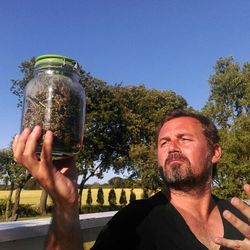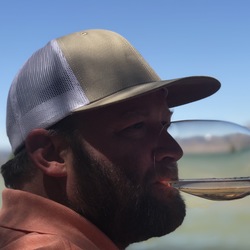Les Sources De Montmirail
Greywacke
Marlborough Pinot Noir 2014
Another winner from Greywacke, Kevin Judd sources his Pinot Noir from the more clay-dominant Southern Valleys. The wine finds a more exotic profile for Pinot - macerated blood orange peel and pomegranate meet a dizzying array of spices and herbs - curry, saffron, smoke, spearmint, and thyme. Savory, well structured, and long. — 8 years ago
Cidrerie du Vulcain
Cidre Premiers Emois
This is as pure and crystalline as the alpine streams that flow past the centuries old apple, pear and quince trees from which Jacques sources all of his fruit. Labeled as an apple, pear and quince wine and for good reason. Elegant and floral and absolutely symphonic. — 9 years ago
Mas des Caprices
Retour Aux Sources Grenache Blend 2014
Encore un peu jeune, très prometteur — 9 years ago
Alain Jaume & Fils
Terrasses de Montmirail Gigondas Red Rhone Blend 2012
Plum and garrigue, medium body, soft lingering finish. Yes. — 10 years ago
Château Brown
Pessac-Léognan Red Bordeaux Blend 2009
2009 - Rouge at les Sources de Caudalie — 10 years ago
Stottle Winery
Tempranillo
This Tempranillo from Stottle Winery is incredible! Notes of spice, blackberry, bing cherries, and tart strawberry. The grapes are sources from the Columbia Valley WA while Stottle is located in Hawks Prairie, Lacey, WA. — 11 years ago
A & P Morin
Saint-Jean Des Sources Picpoul De Pinet
Another picpoul in p-town :) — 12 years ago
Château Livran
Les Sources de Livran Médoc Red Bordeaux Blend 2015
2015 on May 21, 2019
A very distinct, unique red with tannins and fruit, but an unexpected and nuanced presence of berry, slight cinnamon, nutmeg and stone. Amazing round of all the reasons wine is a treasure. Hunting this down again! Costco Christmas package. — 7 years ago
Farella-Park Vineyards
Alta Napa Valley Red Blend 2014
There are some places in the world where they view present day America as a place where we expect to be happy. Should we feel bad they live in places where you should just expect hardship? We live in a time and place where we can focus on building our inner selves and have a chance at....When we're not constantly putting out fires we can really focus on...should that be a source of shame. When the desperate struggle to find food and shelter is finally behind us, we can turn our attention to other sources of pain and truth.
This is the kinda wine you feel bad about being able to enjoy. I feel privileged. — 8 years ago
Domaine des Sources
Olivier Daubresse Selections Vin de Pays du Gard Vieilles Vignes Syrah 1999
Reasonably priced older wine at mint wood place. Excellent and in great shape. — 8 years ago
Yves Cheron
Domaine du Grand Montmirail Cuvée Vieilles Vignes Gigondas Red Rhone Blend 2010
Dark Ruby with sweet dark fruit aromas and herb spice, a blend of 80% Grenache, 15% Syrah and 5% Mourvèdre. On the palate dark berry fruits with coffee & cacao on a dusty tannin structure. Lingering finish ending with herb notes. — 9 years ago
Domaine du Grand Montmirail
Muscat de Beaumes-de-Venise 2010
Special order Christmas dessert wine. Goes great with the Pud...much preferred to Sauternes — 10 years ago
Vina Machali
Cabernet Sauvignon 2014
Had it with the winemaker: a vehement and honest French ex-pat who sources grapes from a couple of plots in the much-lauded Alto Cachapoal. Without touching the acidity or manipulating the alcohol, Machalí is elegant and poised, having precise aromas and complexity, but miles away from that über-common chocolate. — 10 years ago
Domaine du Grand Montmirail
Vacqueyras Red Rhone Blend 2011
Heard a bit too much about north Rhone today...so enjoying this on lamb chop night! — 11 years ago

Domaine Vincent Prunier
Meursault Chardonnay 2008
Located in Cote de Beaune, south of Volnay and north of Puligny Montrachet. Meursault ("Murr-so") has historically been Burgundy's center for white wine production. In fact, nearly all of the 2.5 million bottles produced from 440 ha (1,090 acres) are whites. The soil is a mixture of marl and chalk and is perfectly suited to the production of chardonnay. Meursault wines are known for aromas of hazelnuts, honey and vanilla for its aromas and creamy, almost olive oilllike texture. There are no grand crus in Meursault, though Les Perrières, Les Genevrières and Les Charmes produce remarkable wines. Further, some of the most well-known vineyards of Meursault such as Narvaux and Limozin are not premier cru but Villages-classified vineyards. Recent top vintages include 2008, 2007, 2005, 2002, 1999, 1996, 1993, 1990.
With 437ha. of vineyards dedicated to Villages wine or Premier Cru, Meursault has the largest area permitted to be planted in white wine in the Cote-d'Or. Furthermore, despite the fact that the village lacks even one grand cru, Meursault has historically been Burgundy's center for white wine production, in the past even more so than Puligny-Montrachet or Chassagne-Montrachet. While much of those two villages had in the past been planted to red grapes, Meursault has always been white wine territory. In fact, the modern day vineyard of Les Combettes in Puligny-Montrachet, which forms a continuous chain with the premier crus of Meursault, was once considered part of Meursault and not Puligny, where the many nearby vineyards produced red wine. There are several important factors that determine the reputation of Meursault. Primarily, the soil throughout most of Meursault is perfectly suited to the production of chardonnay; it is a mixture of marl and chalk, that when combined with a largely east or southeast exposure creates healthy grapes that are full of character. Another factor correlates to geology, though in a very different way. Meursault's high water table allows its residents to carve deep, cold cellars "perfect for the production of wine" into the chalky, stony soil. So, while large negociants from Beaune dominated the production and marketing of Burgundy throughout time, Meursault remained a wine of its own citizens. Contributing to this, since red wine has been more prized throughout time, these same negociants looked elsewhere for sources because the wine of Meursault has always been white.
What makes the wine so special? The most common descriptors attached to Meursault are hazelnuts, honey and vanilla for its aromas and creamy for its texture. However, this simplifies things quite a bit. In most cases, Meursault despite an almost olive-oil texture is countered by a precise mineral character, stoniness and a more refined overall palate than, for instance, Chassagne-Montrachet. It's the unique stony/mineral character that often gets lost when tasting Meursault, as many concentrate on the ripe, hedonistic primary flavors and aromas. It's the bipolarity of the wine, the interplay of both factors, that makes Meursault one of the most sought after white wines in the world. As mentioned above, there are no grand crus in Meursault, though many would argue that Perrieres, Genevrieres and Charmes can attain these lofty heights in the hands of the best producers. Further, some of the most well-known vineyards of Meursault such as Narvaux and Limozin are not premier cru but Villages-classified vineyards, though again, the best examples are clearly of higher quality. source: http://www.burgundywinecompany.com/wines/display.php?subregion=Meursault — 12 years ago
Saint Amant
La Borry Côtes du Rhône Viognier 2017
Viognier, from cool and high-altitude reaches of the Dentelles de Montmirail. Asian pear, acacia and just enough tartness and pucker to let you know this isn’t bruised, hot-climate, picked-too-late stuff. Impeccably balanced, long, graceful. I’d put this into a northern Rhône tasting anytime. #domainesaintamant #rhône #viognier — 7 years ago
Château de Montmirail
Cuvée des Deux Frères Vacqueyras Red Rhône Blend 2015
Dynamic wine showing a confident and seductive tension of opposites. Garrigue, leather and barnyard dust plays very well with lavender, red berries and black pepper. Displaying noticeable VA and traces of brett, but Old World charm wins the day as this wine really comes together after about 3 hours to reveal silky tannins and supple structure. Very complex and terroir focused bottling that can be enjoyed for less than the price of a typical Côtes du Rhône, making it a true bargain. — 8 years ago
Pillow Rd. Vineyard
Russian River Valley Pinot Noir 2011
Pillow Rd. Vineyard is situated to the southwest of Sebastopol, not far from the southern tip of the Russian River Valley, and planted to two acres of Chardonnay and seven acres of Pinot Noir. Clones 777, 115, and Pommard made up the first plantings in 2000, with Calera and Swan being added later (replacing Gravenstein apple trees). The vineyard has courted her fair share of suitors, originally being one of Duckhorn’s sources for its Goldeneye Pinot Noir. The first commercial vintage under the Pillow Rd. label was 2006. I’m not sure whether Ladera had entered the scene at that point, but it was definitely in time for their release of the 2009 vintage. In 2016 PlumpJack Group acquired Ladera’s Howell Mountain vineyard and winemaking facility, and while it appears the Pillow Rd. Vineyard wasn’t included in that sale, I haven’t seen anything that spells that out explicitly. Regardless, what is certain is that Napa Cab makers can’t quit this Russian River Pinot vineyard. It had some kinks to work out, but ultimately it’s built for pleasure and not complexity, and it eventually got there. Cherry cola, sassafras, baking spice, butterscotch, and just enough of a citrus edge to keep from losing its balance. — 8 years ago
The Four Graces
Yamhill-Carlton Pinot Noir 2010
Four Graces is one of favorite sources of Pinot Noir in Oregon. This particular one is a fave. 2010 was a good year at Yamhill. — 9 years ago
Chateau des Sources
Costières-de-Nîmes Syrah Grenache 2014
Nice clean finish — 10 years ago
Château Sigalas Rabaud
Sauternes Sémillon-Sauvignon Blanc Blend 2010
2010 - La Table du Lavoir at les Sources de Caudalie — 10 years ago
Brasseries Des Sources
Bellerose Biere Blonde
Fresh, floral, spicy — 11 years ago
Domaine David Clark
Côte de Nuits-Villages Vielles Vignes Pinot Noir 2011
Retour aux (bonnes) sources ! — 12 years ago
Château de Montmirail
Cuvée des deux Frères Vacqueyras 2010
Rhone does California. Big ripe fruit with just the right amount of funk, spice, and earth. Yum! — 13 years ago






















Brad S
Beautiful color. Outstanding value. — 6 years ago